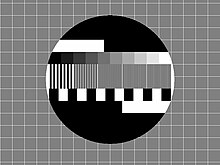Philips PM5540



The Philips PM5540 was an early electronic video signal generator, which generated a monochrome test card[3] that is considered to be a black-and-white predecessor of the widely used Philips PM5544 and the latter's related family of Philips circle test patterns. The content and layout of the pattern, as well as the generator, was designed and made by Danish engineer Finn Hendil (1939–2011) at the Philips TV & Test Equipment laboratory in Amager, south of Copenhagen in 1965–66.[4]
It has been used in Australia, Spain, United Arab Emirates,[5] Denmark,[6] Israel,[7] Qatar, and the Netherlands.[8][9][10][11][12][13]
A heavily modified variant of the PM5540 test card (absence of border castellations and other modifications) was used by Sjónvarpið/RÚV[2][14] of Iceland from 1966 until 1982, and by three regional broadcasters of the German public broadcasting corporation ARD (Sender Freies Berlin, Süddeutscher Rundfunk and Südwestfunk[15]).[16]
Some features of the main test card:[17][3]
- Background - grid of 14 x 10 squares, each square with a white border 2 raster scan lines thick;
- Black and white squares - around the borders, with the four corners being white;
- Circle - has a diameter of 440 scan lines;
- Definition lines - gratings corresponding to 0.8, 1.8, 2.8, 3.8 and 4.8 MHz, allowing measurement of image bandwidth and associated horizontal resolution ;
- Staircase - grayscale linear gradation in 5 steps;
- Background - uniform 50% lightness grey background;
- Needle pulse - white pulse on black background;
Besides the main "Complete Pattern", the hardware was capable of generating other patterns named as "Crossed Lines", "Black/White Steps", "Definition Lines", "Sawtooth", "Vertical Bars" and "Blank Pattern".[3][18][17]
References
[edit]- ^ a b "Radio Bulletin 1972 - Europesche-testbeelden". www.fmtvdx.eu.
- ^ a b "Reception DX TV Islande". dxtv.
- ^ a b c Philips TV-Measuring Equipment (PDF). Philips. 1980. p. 13. Archived from the original (PDF) on 2022-04-08.
- ^ "Dansk Radio - TV historie". danskradio.dk. Retrieved 2023-01-12.
- ^ "Podani György".
- ^ Non-UK Test Cards and Captions - Denmark at the Wayback Machine (archived 2012-06-07)
- ^ "ערוץ 1 - תום שידורים (גרסה 1)". www.youtube.com. 10 July 2010. Retrieved 2020-07-23.
- ^ "Nederlandse Omroep Stichting NOS 1, Philips 5540 Monochrome test card received often on E4 during 1984". March 23, 2015 – via Flickr.
- ^ Non-UK Test Cards and Captions - Netherlands at the Wayback Machine (archived 2012-06-07).
- ^ "Analoge Televisie is gestopt Stukje geschiedenis". www.radio-tv-nederland.nl.
- ^ 1981 • Nederland 1/2 • Mire N&B. YouTube. Archived from the original on 2021-12-08.
- ^ "Testbeelden van de Nederlandse Televisie". www.radio-tv-nederland.nl. Retrieved 2023-01-14.
- ^ "Reception DX TV Pays Bas". dxtv (in French). Retrieved 2023-01-14.
- ^ "Reception DX TV Islande". dxtv (in French). Retrieved 2023-01-14.
- ^ "Altes SWF 3 Testbild". Tab-Multimedia.
- ^ "Radio Bulletin 1972 | Europrse testbeelden". www.fmtvdx.eu.
- ^ a b Black/White Pattern Generator PM 5540 - Operating and Service Manual (PDF). Philips. 1971.
- ^ "Electron Tube Data sheets PM5540". frank.pocnet.net.
External links
[edit]
